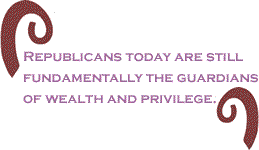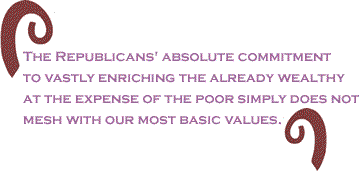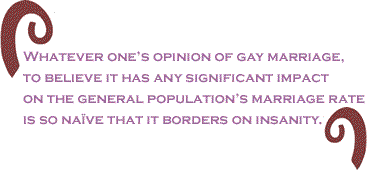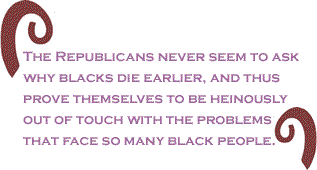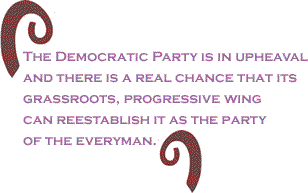
|
|||||||||||||||||||||
 |
Over the past few months President Bush and the Republican Party have been making blatant efforts to court African American voters through black churches. But like the European slavers of old trading guns and rum to African kings for enslaving their own, Republicans offer only disaster. The GOP’s questionable attempts to recast themselves as the abolitionist’s party of civil rights run contrary to their historical record and modern reality. While the Republican Party of Abraham Lincoln was the party for abolition and Reconstruction, it was a very different party than today’s. The Republican Party of Richard Nixon, Strom Thurmond and Newt Gingrich was forged in large part during the late 60s out of white fears and frustration over the Black Power revolutionary spirit, the mandatory implementation of public school integration, and the so-called “abuses” of the affirmative action system. Republicans today have skillfully managed these fears, and others, to rally large swaths of working class Americans against the manufactured boogiemen of the “liberal elite” and their “PC Police.” Nonetheless, Republicans today are still fundamentally the guardians of wealth and privilege. Though they have learned the language of populism, their war against “big government” is really only an attempt to derail and strip away regulations that protect consumers from predatory corporate practices, and supports that seek to protect working people from the most unpredictable financial storms. The sheer weight of the critiques against Republican hypocrisy as they claim to offer us “a new choice,” even while their policy is hurting increasing numbers of black people everyday, should be enough to end this discussion. But on a much deeper level there is a core element to black American identity that should make the GOP fundamentally distasteful to all within the community. Black Identity = Black Unity Though we rightly celebrate the music, art and religion of African American culture the most profound and unique aspect of that culture has always been the primacy of black unity and the drive to uplift the race. This communal spirit has its origin in our African heritage, but its development is purely a consequence of the experience here in the New World. The experience of slavery was a crucible that melded dozens of tribes: farmers and herders, kings and peasants, into a single people for whom the only marginal guarantees in life were one another. In old African communalism the individual supported the group so that the group could protect individual interests, as a matter of course, but here in America this unity became a necessity for survival.
In the 1830, David Walker’s Appeal crystallized this mutual necessity and its connection to emancipation when he stated his belief that for freedmen and slaves alike, “our greatest happiness shall consist in working for the salvation of our whole body.” This ideal reverberates through Reconstruction, the civil rights movement and to the present when social and economic stability is not safe for me and mine, unless it is safe for all of us. All African Americans have to face this responsibility to one degree or another, even if only to rail against it in a search for personal gain. A communal desire for uplifting the race is an integral to the fabric of the black experience here in the United States. And while the specific mechanism for that uplift remains elusive and a matter of debate, the Republicans' absolute commitment to vastly enriching the already wealthy at the expense of the poor simply does not mesh with our most basic values. It seems highly unlikely, given recent history, that they will now shift their basic philosophy and policy to honestly represent wider interests than their true base of “Haves and Have Mores.” The New Dangers So far the Democrats have dismissed the ham-handed appeals to black churches and references to Fredrick Douglass, the Republican, as sloppy and ultimately futile. This assessment may be correct, but the Democrats have excelled at taking the black vote for granted in recent decades. Conversely, the Republican machine has demonstrated a remarkable effectiveness at doggedly refining their message until it strikes a chord. They can read the demographic writing on the wall and they know to continue as the “white sanctuary” may soon leave them out of power. And there are real weaknesses within the black community for them to exploit.
The education gap between black and white grows, just as do the disparities in the health and incarceration rates. Blacks have seen great strides in the last fifty years, but today only a little more than a quarter of African American individuals can be considered economically stable. The black unemployment rate stands just below 11%, nearly double the national average. This means the vast majority of black families are living hand to mouth, paycheck-to-paycheck, and struggling for daily survival. This exposes us like never before to the two-pronged assault the Republicans have waged on White America for thirty years. They offer, on one side, the promise of greater personal riches to those already wealthy, and on the other a smokescreen of “culture wars” for those leaning heavily on the church to find some certainty in uncertain times. The goal of greater personal wealth is naturally universal. One can preach to the sky for unity, rights, and generosity of spirit, but it all carries little weight if the preacher and congregation remain hungry. However, in struggling black neighborhoods, it is equally important to understand the value of community because individual wealth can mean little if one’s neighbors starve. This reflects the very concrete security threat posed when an individual prospers while everyone around him is left to want. For those who have moved to more comfortable, physically safer surroundings, it can be hard to appreciate this reality experienced in impoverished ghettoes, just as one tends to forget how cold it is outside after just a few minutes inside the warmth. And yet, even in predominantly black areas it is increasingly difficult for many in the younger generations to respect the importance of communal growth while constantly bombarded by the “Just tryin’ to get mine,” mercenary rhetoric from prominent stars Jay-Z, 50-Cents, and others, who clearly get an inordinate share of media hype and radio play. Into this bizarre mix steps George W. Bush, who seemingly raised the glass ceiling by promoting African Americans like Colin Powell and Condoleezza Rice to unprecedented high profile positions. But Colin Powell’s term as Secretary of State is a perfect illustration of what a Devil’s deal this is. Once respected for his integrity and self-direction within the restrictive military culture, his service to President Bush’s banner left him ignored, disregarded, and generally irrelevant if not disgraced. The image of Powell holding “evidence” of Iraq’s WMD program, as he stridently argued the case to the UN for an invasion contrary to his beliefs, remains a symbol of the Bush Administration forever etched in the collective consciousness. Yet the siren song grows louder and more persistent.
The Republicans’ most successful infiltration of the black community has been through churches via the gay marriage issue. This track seemed to win many of George Bush’s black votes in the last election, and it is as disheartening as it is shortsighted. A group as historically subjugated and maligned as ours cannot discriminate against others in such a way. That is simple golden rule human decency. Furthermore, only about 4% of the nation’s nearly 38 million black Americans could be liberally estimated to be homosexual, while around 50% of all black households are run by single parents. Taken together those two facts alone demonstrate that, whatever one’s opinion of gay marriage, to believe it has any significant impact on the general population’s marriage rate is so naïve that it borders on insanity. African Americans face enough economic, health and social challenges that affect every one of us, if only through our extended families, that wasting even one moment worrying about homosexuals marrying is a step backward. That black people are often fiscally and culturally conservative has little to do with this discussion. How could a people who have traditionally so little to risk be otherwise? Despite the communal attitude, we are clearly not as monolithic as the term, “the Black vote,” implies. Contrary to popularly promoted ideas of “keepin’ it real” blackness, we need to widen our appreciation for the broad range that has always existed in the black community. And yet, while differences are real and necessary, to not recognize the true emptiness of the Republican promise is to court collective destruction.
The current debate over Social Security is a perfect illustration. President Bush argues that African Americans should support privatization because we don’t live as long, and therefore should be able to cash in, before we check out. Never-mind the fact that the extreme differences in black and white life expectancy are largely due to differing infant mortality rates, the Republicans never seem to ask why blacks die earlier, and thus prove themselves to be heinously out of touch with the problems that face so many black people. To support those who so grossly misrespond to the hard situation facing so many – cutting community development projects, basic food and medical assistance to the poor, and spending ever more to incarcerate than to educate us – is as out-of-touch as it is dangerous. Without question, individuals can succeed financially and politically following the Republican call, but that success provides no security as to the success of their children or extended relations. A black individual can live their whole life trying to ignore the wider problems of the community as a whole, but like it or not, their children will have to deal with that black community. And if we don’t improve, as a community, the way we view education, health, finance, even citizenship, all of our children will continually have to succeed despite their community’s influence, not because of it. The whole cannot succeed without the commitment of successful individuals, but in the long run, the reverse is also true. So Why Bother? The larger political threat to black people is giving into the despair that we are always forced to choose between “Satan or Satan,” when nothing ever changes in our neighborhoods. That feeling is widespread, and in some ways justifiable. But it is also shortsighted. Black Americans are no longer the largest minority voting block and without active work and vocal voting our collective voice will be even further marginalized, thus making it that much more difficult for the many blacks to get out of grinding poverty.
Is the answer then to happily close ranks, and blindly vote election after election for Democrats, regardless of what they say or do? Clearly that isn’t effective. What would be effective, however, is if we all took larger roles in building and directing coalitions that can work to achieve our goals. In this endeavor we have few (read: two) choices: the Republicans and the Democrats. In one we have a party that, at its core, supports the individual enrichment of the powerful and the privileged. On the other, we have a party that has struggled, if imperfectly, to build a system that allows every individual to flourish, by rewarding hard work with the security that even in unforeseen hard times does not mean poverty and failure. Post-election 2004, the Democratic Party is in upheaval and there is a real chance that its grassroots, progressive wing can reestablish it as the party of the everyman. Black people need to be confidently motivated, organized and engaged if we want to be influential under this new Big Tent. This is not a short-term project, nor is it one in which we can simply dictate terms. But it is infinitely better to make small concessions to find common ground, than to sacrifice the most basic tenets that brought us through so much adversity. We stand today at a precarious place. The Republicans seem to be offering to those few successes the final opportunity to assimilate into the American power structure. The price is to simply deny the struggle we have fought, for centuries, together. It is like being offered the role of Cain. When we wonder what will happen to those left behind, the Clarence Thomases and Armstrong Williamses, who have already joined the Republican ranks, seem to ask, “Am I my brother’s keeper?” The rest of us must emphatically answer these brother killers, “Yes, you should be!” We cannot accept this call to stop being “Black and just be American.” That is a false choice. We are American. Though it is often hostile territory, this country is our home as much as anyone else and it wouldn’t be what it is today without our blood sweat and tears. It is our right, and our duty, to not rest until we fulfill the dreams and sacrifices of our forefathers, to make sure all our brothers and sisters have a chance to experience America’s promise. Troy Peters is a Policy Fellow at the Campaign for America’s Future, a progressive political institute based in Washington, DC. He recently returned from volunteering with the Peace Corps in Niger, West Africa, and can be reached at [email protected] |
Your comments are always welcome. Visit the Contact Us page to send e-Mail or Feedback or Click here to send e-Mail to [email protected] e-Mail re-print notice
If you send us an e-Mail message we may publish all or part of it, unless you tell us it is not for publication. You may also request that we withhold your name. Thank you very much for your readership. |
| March 24 2005 Issue 131 |
|||||||||
|
|||||||||
|
|
|||||||||
| Printer Friendly Version | |||||||||
 |
|||||||||
 |
|||||||||
| |
|||||||||
| |
|||||||||






















